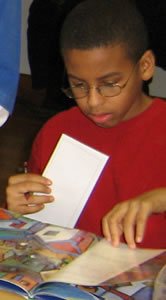 Constructivism
Constructivism
Constructivism is a theory of teaching and learning that draws on a range of teaching practices including inquiry-based learning, cooperative learning, and project-based approaches.
Constructivism involves the process of questioning, exploring, and reflecting. This theory says that learners should construct their own understanding and knowledge of the world through varied experiences. By reflecting on these experiences, students assimilate useful information and create personal knowledge.
This approach is an extension of John Dewey's philosophy that learning comes from student involvement in meaningful experiences where each child can interact and reflect.
According to Barbara Stripling in Curriculum Connections through the Library (2003, p. 4), in a constructivist learning environment "students are expected to ask questions and seek new understandings; teachers are expected to change their roles from providers of information to provokers and guides of student learning".
![]() Complete Constructivism as a Paradigm for Teaching and Learning the free, online workshop from Educatonal Broadcasting Corporation.
Complete Constructivism as a Paradigm for Teaching and Learning the free, online workshop from Educatonal Broadcasting Corporation.
Teaching Strategies
Many active teaching and learning techniques reflect the constructivist approach. These include problem-based learning, real-world simulations, case study approaches, and scientific experiments. Metacognition, or thinking about thinking is an important activity in the constructivist classroom. Students are encouraged to constantly raise questions and explore ideas.
 Video Teaching and Learning (2:52).
Video Teaching and Learning (2:52).
In this video interview, Daniel Callison discusses gaps in teaching and learning as well as the importance of questioning and knowledge construction. He focuses on gaps of ability, gaps of students-teachers-media specialist, and gaps of opportunity for students to prove themselves.
Use of this video clip complies with the TEACH act and US copyright law. You should be a registered student to view the video.
![]() Read Key Word: Constructivism in THE BLUE BOOK by Callison and Preddy, 334-339.
Read Key Word: Constructivism in THE BLUE BOOK by Callison and Preddy, 334-339.
Key Words
Learn More
Constructing Knowledge in the Classroom from Southwest Educational Development Laboratory (SEDL)
Constructivism: The Theory and the Controversy from Digital Literacy
Constructivism from Funderstanding
Constructivism by M. Ryder from University of Colorado at Denver
Constructivism in the Classroom from Math Forum
Constructivist Learning Design by G.W. Gagnon, Jr. and M. Collay
Constructivist Teaching and Learning Models from North Central Regional Educational Laboratory
Constructivist Theory (J. Bruner).
The Instructional Use of Learning Objects (Online) edited by D. Wiley
